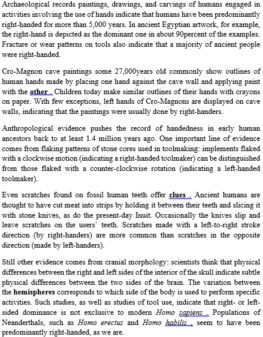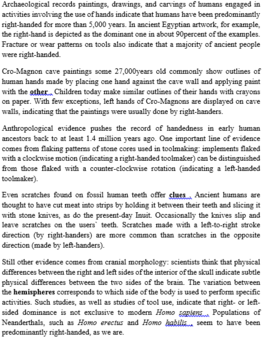Read the following passage and mark the letter A, B, C, or D on your answer sheet to indicate the correct answer to each of the questions from 36 to 42.
Thanksgiving is celebrated in the US on the fourth Thursday in November. For many Americans it is the most important holiday apart from Christmas. Schools, offices and most businesses close for Thanksgiving, and many people make the whole weekend a vacation.
Thanksgiving is associated with the time when Europeans first came to North America. In 1620 the ship the Mayflowers arrived, bringing about 150 people who today are usually called Pilgrims. They arrived at the beginning of a very hard winter and could not find enough to eat, so many of them died. But in the following summer Native Americans showed them what foods were safe to eat, so that they could save food for the next winter. They held a big celebration to thank God and the Native Americans for the fact that they had survived.
Today people celebrate Thanksgiving to remember these early days. The most important part of the celebration is a traditional dinner with foods that come from North America. The meal includes turkey, sweet potatoes (also called yams) and cranberries, which are made into a kind of sauce or jelly. The turkey is filled with stuffing or dressing, and many families have their own special recipe. Dessert is pumpkin made into a pie.
On Thanksgiving there are special television programs and sports events. In New York there is the Macy's Thanksgiving Day Parade, when a long line of people wearing fancy costumes march through the streets with large balloons in the shape of imaginary characters. Thanksgiving is considered the beginning of the Christmas period, and the next day many people go out to shop for Christmas presents.
Which of the following is NOT true?
A. In the US, Thanksgiving is not a national holiday; it's a religious holiday
B. Christmas comes less than a month after Thanksgiving
C. Thanksgiving was originally celebrated by the first Europeans in North America to thank God for their survival
D. The Macy's Thanksgiving Day Parade is colorful and exciting





Đáp án A
Câu nào sau đây không đúng?
A. Ở Mỹ, Lễ tạ ơn không phải là quốc lễ; là một ngày lễ tôn giáo.
B. Giáng sinh đến sau Lễ tạ ơn khoảng chưa đến 1 tháng.
C. Lễ tạ ơn lúc đầu được tổ chức bởi những người châu Âu đầu tiên ở Bắc Mỹ để cảm ơn thượng đế đã giúp họ sống sót.
D. Cuộc diễu hành vào ngày lễ tạ ơn của Macy đầy màu sắc và thú vị.
Dẫn chứng: Thanksgiving is celebrated in the US on the fourth Thursday in November. For many Americans it is the most important holiday apart from Christmas....Today people celebrate Thanksgiving to remember these early days.